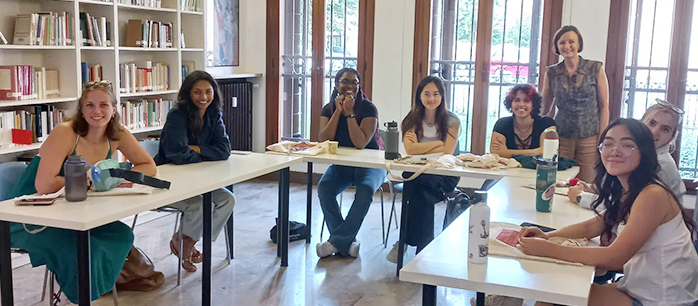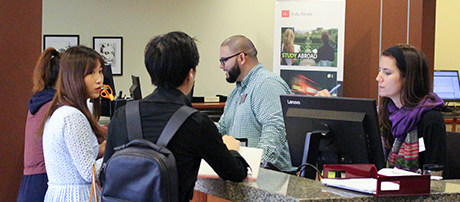BU Study Abroad is here to support students with physical, psychological, and learning disabilities on BU Study Abroad programs around the world. It is important to discuss this information so our staff can help you plan, and research the attitudes, perceptions, and laws surrounding accessibility abroad, as these things may vary depending on where you go.
Boston University Study Abroad is deeply committed to creating an accessible and inclusive learning environment for students with disabilities. Accommodations are granted on an individual basis by the BU Disability and Access Services office (DAS). Students requesting accommodations are strongly encouraged to contact Study Abroad staff as soon as they begin to plan their Study Abroad experience. Staff in Study Abroad and DAS work together to answer questions, advise on availability of accommodations by program, and arrange for services abroad.
Please remember, disability or chronic illness will never be used as a reason to deny a student acceptance into a study abroad program or prevent them from participating. However, the earlier you inform our office, the better we can assist you in preparing for your study abroad experience and arranging any accommodations you may need. Email us at abroad@bu.edu early in the process to get started.
The following reflection questions may be helpful to consider:
General Questions
- Are there laws and/or protections for people with disabilities in my host country?
- How does the chosen host culture(s) define disability? How will questions about disability be answered?
- What types of accommodations might I need while abroad in order to have a successful experience?
- Does the host college or university, if your program uses a partner school, have a disability services office or a point of contact designated to address accommodations needs?
- How important is it for me to study in a place where disability accommodations are well-developed and cultural attitudes towards people with disabilities are progressive?
- What are the housing arrangements? Are they accessible?
- Will my disability prevent me from participating in some activities or excursions at my host university/in my host country?
Transportation Questions
- What are the airline’s accommodation capabilities?
- What kinds of physical/mobility expectations would be placed on students participating in this program?
- What kinds of travel accommodations will be required during travels within the city as well as between destinations?
- How accessible are places in my host country? How much do physical accessibility aspects like distance across campus, public transportation, weather, etc. matter to me?
- Will covering costs of private taxis be feasible, when necessary, due to inaccessible public transportation?
- What are the overall conditions of the public sidewalks and pavement of streets?
Housing Questions
- What housing options are available through the program?
- Are the room dimensions physically accessible to individual needs?
- Are there elevators available in my housing facility?
- Are there accessible bathroom and shower facilities? How close are they to my room?
- What are the sleeping arrangements like in my program?
Curriculum Questions/Academic Accommodations
- How are the courses designed? Who delivers the courses and what type of coursework will be required in your study abroad program?
- Does this program fit my learning style?
- I use interpreting and/or real-time captioning. Will these services be available to me on my study abroad program?
Medical Questions
- How will refills of prescription medications be handled, especially if they are stimulant medication? Is my prescribed medication legal and available in my host country?
- I’m currently working with a mental health care provider. Will I be able to continue my sessions over skype or another platform?
- Are replacement parts for auxiliary aids readily available in the event of loss or damage?
- What types of medical care are available? Will I be able to access necessary medical care or medication abroad?
Disability & Access Resources
BU Resources & Community
General Resources
Site specific
International Health Insurance
Students are covered by the International Health Insurance when participating in our international BU Study Abroad programs. In addition to working closely with the office of Disability & Access Services, we encourage students to contact International SOS, the plan administrator, for pre-trip planning so you have a sense of what to expect and have plenty of time to prepare before arriving in your host city. This service is available to students participating in an international program and can be accessed any time.
Considerations for Students with Blindness & Low Vision
Students needing accommodations for blindness and low vision should work closely with the office of Disability and Access Services. Starting this conversation early will help you choose the program that will be the best fit for you and ensure our staff can provide as much support as possible.
Considerations for Students with Chronic Illness
While studying abroad is extremely rewarding, the physical demands of traveling abroad and adjusting to a new time zone, culture, and environment can be physically and mentally stressful. This is especially true for students with chronic illnesses, such as diabetes, asthma, arthritis, autoimmune disorders, or other conditions. Students with chronic illnesses may need to plan in advance to arrange for their ongoing medical care while abroad. It is important to discuss your plans with your doctor and work with our office to ensure you choose a location with access to the medical treatments, prescriptions, and accommodations you use at home.
If you are managing a chronic illness or ongoing medical condition, please reach out to your program manager. Chronic illness will never be used as a reason to deny a student acceptance into a study abroad program or prevent them from participating. However, the earlier you inform our office, the better we can assist you in preparing for your study abroad experience and arranging any accommodations you may need.
Considerations for Students with Deafness or Hearing Impairment
Students needing accommodations for deafness or hearing impairment should work closely with the office of Disability and Access Services. Starting this conversation early will help you choose the program that will be the best fit for you and ensure our staff can provide as much support as possible.
Considerations for Students with Learning & Attentional Disabilities
Our staff works closely with faculty, and in some cases administrators at partner universities, to make sure students are able to succeed while abroad. If you require accommodations for learning or attentional disabilities, be sure to reach out to both our office and to the office of Disability & Access Services with plenty of time before arriving in your host city. Our onsite staff may also have additional resources to help support you. If you take prescription medication, be sure to work with GeoBlue as there may be differences in the price, availability, or legality of some prescription drugs abroad.
Considerations for Students with Physical Disabilities
Boston University Study Abroad is deeply committed to creating an accessible and inclusive learning environment for students with disabilities. While we try to make our sites and facilities as accessible as possible, there are some limitations to what we can do, and it is important to discuss your needs with your office of Disability & Access Services and BU Study Abroad. The more time we have to plan, the better we will be able to support you.
Mobility International USA – Resource for students with disabilities going abroad
Considerations for Students with Psychological Disabilities
Mental health support services vary by destination. Students are encouraged to discuss the advisability of studying abroad with their mental health professional, as pre-existing mental health conditions may be triggered or intensified by the stress of adjusting to unfamiliar surroundings. Furthermore, remember that jet lag can greatly affect a medication schedule, so making a plan for any medication adjustments is crucial. Study Abroad staff are available to answer questions about mental health concerns and the availability of support services by program.
Please email abroad@bu.edu and work closely with the office of Disability and Access Services to make a plan to continue your care while abroad. Our onsite staff can provide local resources and most discuss mental health services during the onsite orientation. GeoBlue pre-trip planning can also help you research mental healthcare providers in your host city and answer questions you may have.
Considerations for Students with Substance Use or Eating Disorders
While you may have developed coping mechanisms for managing substance use or eating disorders at home, studying abroad may potentially disrupt your routine. Cultural norms surrounding food, alcohol, and other substances vary around the world. Especially if you will be living with a host family, you may find that you have less control over what you consume while abroad than you are used to at home. You may also feel increased pressure to eat or to drink alcohol as cultural attitudes towards food and alcohol can vary greatly. Our staff can help you prepare for and navigate these situations, whether it be with a well-meaning host family or with your peers.
If you are managing a substance use or eating disorder, we encourage you to discuss your study abroad plans with your health care team. We also encourage you to reach out to your study abroad Program Manager if you need any accommodations or support. Disclosing this information will help us prepare you for what to expect and learn how to maintain your self-care strategies abroad. Having an open dialogue with us can help our site staff arrange accommodations in your housing, on excursions, and throughout your program to create a supportive environment.
If you don’t feel represented on this page or if you feel that other resources or terminology should be included, please reach out to us to contribute your thoughts. This is a living document that is a work in progress that we’d like you to collaborate with us on. If you would like additional resources, or if you have found your own resources that other students could benefit from, please don’t hesitate to contact us at abroad@bu.edu.



